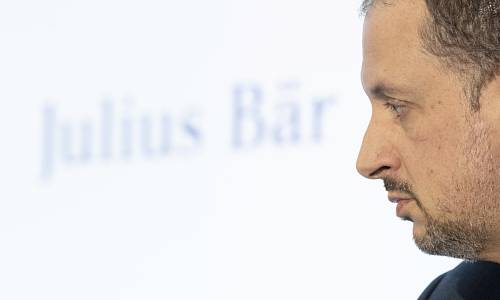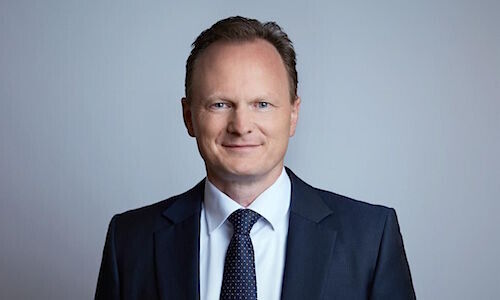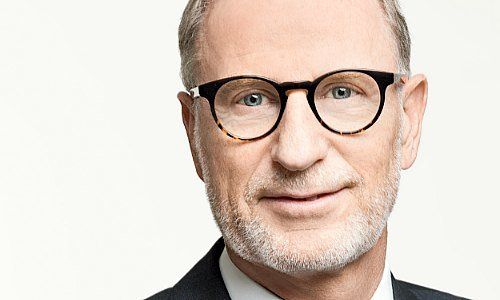For the past 15 years, the private bank's revolving door has been spinning out one CEO after another. Now Nic Dreckmann is up for the sacked Philipp Rickenbacher. But it is not a permanent step – and the bank wants to put a stop to internal appointments.
At the end of the day, Philipp Rickenbacher (image below) had no choice but to put a good face on a bad situation. On Thursday, in front of analysts, the media, and on LinkedIn, he said he was «deeply grateful» for having the opportunity to lead Julius Baer as CEO.
He also apologized to shareholders, clients, and employees, saying the bank was wrong about its assessment of the risks in its private debt business, ultimately failing in his responsibility towards the bank.

(Image: Keystone)
A Tragic Undertone
That mistaken assessment is now forcing the 52-year-old to leave the bank entirely after being the CEO for five years, as finews.com previously reported. During his watch, the once pure-play private bank had likely funneled more than 600 million francs in loans to the collapsed business empire founded by Austrian entrepreneur René Benko.
According to what we know now, the pledged collateral was not up to snuff and the bank couldn't keep up with the situation.
That has now cost Rickenbacher his job. There is a certain tragic undertone to it all. When he started in 2019, the talented McKinseyan had quickly climbed the internal career ladder. He was seen as a kind of night in shining armor, a source of hope after an era of exaggerated growth and compliance gaps.
Familiar Face
Nic Dreckmann (image below) is taking over on an interim basis. That looks like a reasonable step at first glance. In a restructuring last year, he was appointed deputy CEO. He has deep expertise with the bank's IT system and its so-called second home market – Asia. For years, the COO was seen as a constant that held up the overall leadership framework.
More to the point, he was also a CEO candidate five years ago.

(Image: Julius Baer)
Little Sign
But Dreckmann's appointment is a pattern that has not brought the private bank much luck – that of having to fill gaps quickly. Rickenbacher's successor, Bernhard Hodler (image below), was thrown into the driver's seat almost overnight in 2017.
His predecessor was Boris Collardi (last image on page), the poster child for that entire era, who gave the bank a fait accompli by becoming a partner at Pictet without warning.

(Image: Julius Baer)
Putting Out Fires
Hodler was a long-tenured head of compliance under Collard and he found himself, at the age of 57, constantly having to put out fires. It was the dark side of the quick growth of the Collardi era, and he had to clamp down. He was forced to cut costs and put the business in Latin America on a better footing, not least as the Swiss regulator Finma was increasingly interested in what was going on there.
In 2020, Finma intervened after they uncovered severe gaps in the bank's anti-money laundering activities. By then, the board had already sent Hodler into early retirement. But a bitter taste hung heavy in the air given the bank clawed back his bonus while he also received a warning from the regulator, and Finma still does not allow the bank to engage in large takeovers.

(Image: Keystone)
External Candidates
Julius Baer chairman Romeo Lacher, who back in the day was looking for a successor for Holder and ostensibly found one in Rickenbacker, doesn't want to go down the same path again. As Lacher indicated at the news conference on Thursday, the bank is looking for an external candidate to take up the CEO role.
The last time the private bank did that was in 2007 when it appointed Alex Widmer. He had only been recently hired away as the former head of Credit Suisse's much larger private banking business in 2005. After being demoted, he had turned his back on what was then Switzerland's second-largest bank.
No Internals
But only a year later, at the end of 2008, Widmer committed suicide. The board had to look immediately for a replacement and it found one in the then 34-year-old Collardi, who had followed Widmer in from Credit Suisse in 2006. He quickly went on to become a high flier.
Now, the board members again face the choice of having to carefully select their next candidate and look above and beyond the internal talent pool. That also makes sense given that the bank's highest leadership, such as finance head Evie Kostakis and risk management head Oliver Bartholet can't wash their hands entirely free of the Signa debacle.
Major Bankers?
The finance sector is already speculating who could come into question, at least from a Swiss perspective.
Some names that have been cropping up include André Helfenstein, Credit Suisse's Swiss head, as his leeway under UBS supervision has shrunk dramatically. So has August Hatecke, the current private banking head of UBS in Switzerland, who brings the necessary Asia Pacific experience. Another frequent mention is Adrian Kuenzi, the former head of Notenstein and head of Geneva-based UBP's business, who has the necessary knowledge of private banking boutiques.
Additional reporting: Jule Woermann



































